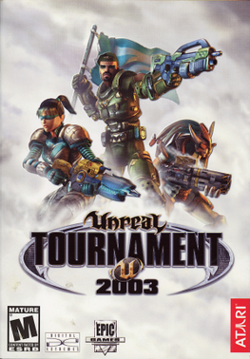This article needs additional citations for verification .(April 2009) |
| Unreal Tournament 2003 | |
|---|---|
 | |
| Developer(s) | Epic Games Digital Extremes |
| Publisher(s) | Infogrames [a] MacSoft (OS X) |
| Designer(s) | Cliff Bleszinski James Schmaltz Shane Caudle |
| Programmer(s) | Steve Polge |
| Composer(s) | Kevin Riepl Starsky Partridge |
| Series | Unreal |
| Engine | Unreal Engine 2 |
| Platform(s) | Windows, Mac OS X, Linux [1] |
| Release | Windows Mac OS X
|
| Genre(s) | First-person shooter |
| Mode(s) | Single-player, multiplayer |
Unreal Tournament 2003 is a first-person arena shooter video game developed by Epic Games and Digital Extremes, and published by Infogrames under the Atari brand name. The game is part of the Unreal franchise, and is a sequel to 1999's Unreal Tournament . Like its predecessor, the game is designed mainly for multiplayer gaming.
Contents
The game saw a record 1.2 million downloads when the demo was released. [4] In addition, the Unreal Engine has been widely licensed for games such as the Tom Clancy's Rainbow Six series, Splinter Cell , and America's Army .
An Xbox port, Unreal Championship was released on November 12, 2002. Unreal Tournament 2003 would be rereleased as Unreal Tournament 2004 , which was released on March 16 of that year.